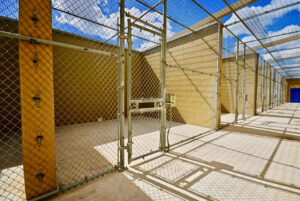After weeks in a Texas camp, the college grad from North Port walked across a bridge to Mexico last week.
By Ramon Lopez
Original Air Date: August 13, 2025
Host: Last week, Lulu Martinez walked across a bridge to Mexico. She is a 22-year-old recent college graduate who grew up in Sarasota County, and she ended up in ICE detention in Texas after hometown police arrested her in June after a wrong U-turn in North Port. WSLR News reporter Ramon Lopez had an extended interview with her in which she described her experience in ICE detention.

Maria Martinez
Ramon Lopez: 22-year-old Maria Martinez, who’s from North Port, is a college graduate. Maria, called Lulu by family and friends, planned to pursue her dream of becoming a pilot.
But she was detained by a North Port cop for making an illegal U-turn. He found out she did not have a drivers license and was an undocumented immigrant, having come to Florida with her family when she was 12.
She was turned over to Immigration and Customs Enforcement, or ICE, agents. Maria eventually ended up in ICE’s El Valle Detention Facility in Raymondville, Texas, which is operated by a private company for ICE.

El Valle Detention Center. Photo: Butler & Cohen
Maria told WSLR news from outside Mexico City in a Zoom hookup she never feared the guards, but concern for her safety was there.
Maria Martinez: I was really scared. I didn’t even want to use the bathroom. I didn’t take a shower either. We had to get used to it, like by using the bathroom, take a shower with other girls—I tried to get used to it.
I was scared of the detainees. When we first got there, I remember they started yelling. I heard one of the girls. She said that we were fresh meat. They try to scare the new girls.

El Valle Detention Center. Photo: Butler & Cohen
RL: Maria described her day-to-day routine at El Valle.
MM: I would wake up at 6:00 in the morning to eat breakfast. Lunch was around 12:00 or 1:00, and the dinner was around 6:00, 7:00. I was always at the gym, trying to go outside—you know, try to keep myself busy.
RL: Detainees had their cellphones confiscated. To earn money for paid outgoing calls only from a handful of wall-mounted phones and tablet video visits with family, you could work in the kitchen or laundry. The pay? $1 a day. You paid $6 for 30 minutes on a tablet.
Detainees needed cash from outside to pay for phone calls, video visits and items from the commissary, including bottled water. But you stood in line with 100 other detainees to call out, so calls were few and far between.
MM: It was really complicated—it was really tough—because we only had 14 tablets—just 12 or 11 really work. To try to get a tablet each, you had to really fight for it. For so many girls to try to make a video call, you had to be fast.
RL: The barracks-like housing included open toilets and showers affording no privacy.
MM: The bathrooms—there’s, like, six bathrooms, I think—they’re all open. The showers are open as well.
When I first got there, I was really scared. I didn’t even want to use the bathroom. I didn’t take a shower either.
RL: The place was air conditioned properly, had beds for all the detainees, but the drinking water was terrible.
MM: The water is—I don’t know where they get the water from, but it’s not good. Sometimes it tasted funny. The water that we drank, we had to take from the bathroom. Not, like, the toilet, but it’s the same water we take a shower with.
RL: Maria had to fight off boredom, dearly missed her family and cherished their video visits.

Maria Martinez
MM: It was really hard having to start again, to say bye to my friends, to my family. It was a big change, and it was really hard for me to process that. I do have a lot of friends that ask me if I miss Florida, and I do. I do miss it a lot, because almost my whole life was there because I moved in when I was very little. What I miss the most and what was the most important for me was my family because I had never been apart from them. That was the most difficult thing for me to process—that I was going to be apart from my family.It was always good talking to her—talking to my family. It was a distraction from everything that I was going through.
RL: She appeared before an immigration court but was denied bond because she was considered a “threat to society” for driving without a license and returned to the El Valle Detention Facility.
She then had two options. Her first was to appeal the bond denial, remaining at the detention camp for many more months, in hopes of being released. Her other choice was to voluntarily self-deport to Mexico.
Maria’s attorney told WSLR News she seriously doubted Maria would win her freedom and would have eventually been deported anyway. So, Maria elected to take self-deportation to Mexico to escape imprisonment.
Tune in Friday for Part 2 of Maria’s story. She will discuss her “voluntary” decision to self-deport, her feelings as she crossed the U.S.-Mexico border, and her start of a new life in Mexico as a free woman.
Then, in Part 3 next Wednesday, Lulu will discuss her immediate and long-term plans, her immigration legal status and possible options, and her family’s decision to join her in Mexico, leaving Florida forever.
This is Ramon Lopez for WSLR News.
WSLR News aims to keep the local community informed with our 1/2 hour local news show, quarterly newspaper and social media feeds. The local news broadcast airs on Wednesdays and Fridays at 6pm.
See our previous reporting here:
North Port college grad detained and mistreated, family says
After weeks of ICE detention, Lulu Martinez yields to pressure
Lulu Martinez denied bond, continues in ICE detention in Texas
After weeks of ICE detention, Lulu Martinez yields to pressure